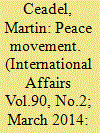| Srl | Item |
| 1 |
ID:
114983


|
|
|
|
|
| Publication |
2011.
|
| Summary/Abstract |
Norman Angell's The Great Illusion, which ran through six versions in London between November 1909 and December 1938, has some claim to have launched International Relations as a self-consciously independent yet sub-consciously liberal discipline. Understood to argue primarily that the interlocking fragility of the international financial system stopped modern states profiting from aggression, its ideas were promoted by a specially created foundation as 'the science of international politics' or 'international polity'. Since the 1970s, moreover, the book has been credited by scholars with pioneering the concepts of interdependence and globalisation. Now, therefore, it is less its seminal qualities than its fundamental flaws that require emphasis. Its celebrated claim about the irenic implications of financial interdependence was widely misunderstood as implying the impossibility, in addition to the disutility, of aggression. And a little-noticed second argument - that political control over territory brought no substantive benefits - was not only implausible but inconsistent with Angell's declared opposition to cuts in arms spending. The Great Illusion's policy recommendations were thus ambiguous, and altered from edition to edition as its author grappled first with the contradiction between pacifist and pro-defence strands in his thinking and then with the changing international situation.
|
|
|
|
|
|
|
|
|
|
|
|
|
|
|
|
| 2 |
ID:
131429


|
|
|
|
|
| Publication |
2014.
|
| Summary/Abstract |
The First World War led to the reconstruction and reinvigoration of the British peace movement, which steadily increased in activity and impact from 1914 until the end of the 1930s. This article defines the movement, explains why it emerged first and developed most influentially in Britain, and outlines the various phases of its history from the 1790s until the present day. It concentrates on the less well known phases of the movement's history: its origins during the French Revolutionary and Napoleonic Wars and on its moments of political significance during the nineteenth century. It says less about the post-1945 movement, which readers of International Affairs will be more familiar with, though it makes the point that 'peace' is currently being trumped as the primary political goal of most progressives by 'human rights', which can be invoked to justify military intervention.
|
|
|
|
|
|
|
|
|
|
|
|
|
|
|
|
| 3 |
ID:
037316


|
|
|
|
|
| Publication |
Oxford, Oxford University Press, 1987.
|
| Description |
222p.
|
| Series |
OPUS books
|
| Standard Number |
0192192000
|
|
|
|
|
|
|
|
|
|
|
|
Copies: C:1/I:0,R:0,Q:0
Circulation
| Accession# | Call# | Current Location | Status | Policy | Location |
| 028859 | 327.17/CEA 028859 | Main | On Shelf | General | |
|
|
|
|